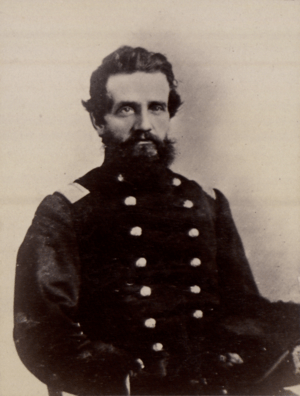Friend Smith Rutherford facts for kids
Quick facts for kids
Friend Smith Rutherford
|
|
|---|---|
 |
|
| Born | September 25, 1820 Schenectady, New York |
| Died | June 20, 1864 (aged 43) Alton, Illinois |
| Buried | |
| Allegiance | |
| Service/ |
Union Army |
| Years of service | 1862–1864 |
| Rank | Colonel Brigadier General |
| Commands held | 97th Illinois Infantry Regiment |
| Battles/wars |
|
Friend Smith Rutherford (born September 25, 1820 – died June 20, 1864) was an important officer in the Union Army during the American Civil War. He was a colonel and led the 97th Illinois Infantry Regiment. This regiment played a big part in the Vicksburg campaign.
Just before he died, President Abraham Lincoln nominated Rutherford to become a brigadier general. The United States Senate approved this, but Rutherford had already passed away. So, even though he was nominated, he never officially became a general.
Contents
Early Life and Family
Friend Smith Rutherford was born in Schenectady, New York, on September 25, 1820. His great-grandfather was Doctor Daniel Rutherford. He was a Scottish scientist famous for discovering nitrogen.
Friend Smith Rutherford had four brothers and sisters. Two of his brothers, Reuben Clifford Rutherford and George Valentine Rutherford, also became generals in the Union Army.
In 1849, Friend Smith Rutherford married Letitia VanDyke Sloss. They had five children together.
Rutherford studied law in Troy, New York. Later, he moved to Alton, Illinois, where he worked as a lawyer.
Joining the Civil War
On June 30, 1862, Rutherford joined the Union Army. He first served as a captain. Soon after, he helped create the 97th Illinois Infantry Regiment. This group was formed in Illinois in August and September 1862. On September 16, 1862, Rutherford became the colonel, or leader, of this regiment.
His regiment first served in Kentucky. Then, they moved to Memphis, Tennessee. They became part of a larger army group called the XIII Corps, led by Major General William Tecumseh Sherman.
The Vicksburg Campaign
In December 1862, General Sherman led his troops to attack Vicksburg, Mississippi. Vicksburg was a very important Confederate base on the Mississippi River. The Union Army wanted to control the entire river.
At the Battle of Chickasaw Bayou, Rutherford's regiment was part of Sherman's attack. However, the Union forces faced strong resistance and had to retreat. They suffered many losses.
Battle of Arkansas Post
In January 1863, Rutherford's regiment joined another attack. This time, they went up the Arkansas River to attack Fort Hindman. This battle took place from January 9 to 11, 1863. Rutherford's regiment helped in a difficult but successful attack on the Confederate defenses.
Moving Towards Vicksburg
After the Battle of Arkansas Post, Rutherford's regiment was still part of the XIII Corps. They took part in the Battle of Port Gibson on May 1, 1863. The Union Army slowly pushed back the Confederate forces, who eventually had to retreat.
Champion Hill and Big Black River
On May 16, 1863, Rutherford's regiment fought in the Battle of Champion Hill. This was a very important battle in the Vicksburg campaign. His regiment had to hold their position under heavy enemy fire. Even so, they had only a few casualties. After this battle, the Confederates retreated towards Vicksburg.
The next day, May 17, 1863, Rutherford's corps fought at the Battle of Big Black River Bridge. Union soldiers surprised the Confederates, forcing many to retreat into Vicksburg. Many Confederate soldiers were captured.
Siege of Vicksburg
On May 19 and May 22, 1863, Rutherford led his regiment in attacks on Vicksburg's defenses. The Union forces lost many soldiers. So, General Ulysses S. Grant decided to surround the city instead of attacking head-on. This was called the Siege of Vicksburg.
Rutherford's regiment stayed and fought during the siege. The siege ended on July 4, 1863, when the Confederates surrendered.
Illness and Return to Duty
After the Vicksburg campaign, Rutherford became very sick with "camp dysentery." He had to go home to Alton, Illinois, to recover.
Because he did not extend his leave properly, he was temporarily removed from service. However, he appealed to President Lincoln. On November 11, 1863, Lincoln put Rutherford back in command of his regiment. Rutherford rejoined his regiment in New Orleans, Louisiana. They were on duty there until May 1864.
Death and Posthumous Honor
Rutherford never fully recovered from his illness after the Vicksburg campaign. On June 15, 1864, he resigned from the army because of his poor health. He returned to Alton, Illinois. Sadly, he died just five days later, on June 20, 1864. He was buried in Alton Cemetery.
Two days before he died, on June 18, 1864, President Abraham Lincoln nominated Rutherford to be a brigadier general. The United States Senate approved this on June 28, 1864. However, no one knew that Rutherford had already passed away on June 20. So, even though he was nominated and approved, he never officially served as a general.
See also
- List of American Civil War generals (Union)
 | Selma Burke |
 | Pauline Powell Burns |
 | Frederick J. Brown |
 | Robert Blackburn |

